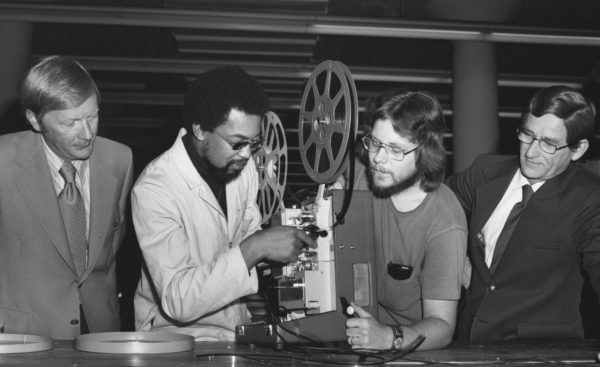

AMIA recognizes that advocacy is essential in supporting the preservation of our media heritage and in championing a multiplicity of voices in the historical record. The Advocacy Committee aligns with AMIA’s mission in supporting public and professional education in relation to the preservation and use of moving image media, and furthering professional communication and collaboration.
Working with members, committees, and the board, AMIA’s Advocacy Committee develops strategic recommendations and actions to further the interests of the field and represent those interests to the wider community, resource allocators, policy makers, and to the public. The Committee works to identify and promote opportunities to shape public perception and raise awareness of archives and archival professionals, explores ways that AMIA can be responsive to and advocate for the resources needed by archives and archival professionals; and suggests strategic collaborations and partnerships as methods of amplifying advocacy efforts.
In recognition that advocacy is integral to AMIA’s mission, in 2018 the membership committee on advocacy was transitioned to the Advocacy Committee of the Board.
The AMIA Advocacy Committee and Board have worked together to adopt AMIA’s first Advocacy Policy, outlining guidelines, whether at the local, state, federal or international levels and the procedures for determining how, when, and to what extent AMIA should become involved.
AMIA believes that advocacy is essential for promoting the importance of archives and archivists as the stewards of our media heritage. As an organization that values social responsibility, the public good, and the accuracy of the public record, AMIA also encourages its members to engage in advocacy as individuals, in accordance with their own values and priorities.
The Advocacy Committee encourages AMIA members to bring advocacy issues forward to the Committee via the Advocacy Form.
On March 14, an Executive Order from the White House directed the Institute of Museum and Library Services (IMLS) to be reduced to only its “statutory functions,” threatening to eliminate key funding for libraries, archives, and museums nationwide. IMLS is the only federal agency dedicated to supporting library services, providing essential grants, research, and policy development that empower communities in every U.S. state and territory.
IMLS must submit a report within seven days outlining which functions, if any, are statutorily required. It also requires that “non-statutory components and functions shall be eliminated to the maximum extent…” This fast-moving process puts critical cultural heritage programs at risk of being eliminated, with no indication of how it would impact current projects.
IMLS plays and has played a crucial role in funding projects in our field, including AMIA’s Pathways Fellowship, the Autistic Voices Oral Histories, and CAW with two new community focused projects proposed this year.
What can you do?
IMLS was created by Congress, and Congress has the power to protect it. Contact your representatives today and urge them to preserve federal funding for libraries, archives, and museums. We are all aware of critical programs possible only because of funding provided by IMLS. Share your story when you contact your representatives and how it impacts their communities. Let them know that federal support for cultural heritage is not optional—it’s essential.
Call. Write. Advocate.
In November 2020, the Association of Moving Image Archivists (AMIA) launched the AMIA Annual Salary & Demographics Survey of the Field. This study was a continuation of research conducted by AMIA in 2019 and it was also informed by similar surveys commissioned by the Society of American Archivists and American Library Association. Like other studies from allied cultural heritage professions, the AMIA survey demonstrates that diversity is lacking in the audiovisual archives field and that serious and deliberate effort must be made to address this. AMIA has already taken some actions in response to this, such as the development of the AMIA Pathways fellowship program that will fund young professionals from diverse backgrounds in paid internships and mentorship activities. Additionally, the 2020 survey showed some issues with archivists’ costs of living and workplace conditions, especially in the wake of the COVID–19 pandemic, that should inform the AMIA’s future advocacy efforts.
A primary initial responsibility of the Advocacy Committee of the Board (ACOB) was to conduct a first-ever survey to gather information on advocacy concerns as they affect the moving image archive community. The report was developed using the qualitative information from respondents from the survey, but also from the open forum and roundtable discussions the AMIA Board and ACOB co-organized at AMIA 2018.
The goal of this report is to be a first step in dialogue around the need to develop strategic recommendations and actions to further the interests of the field and represent those interests to the wider cultural heritage community, resource allocators, policy makers, and the public.